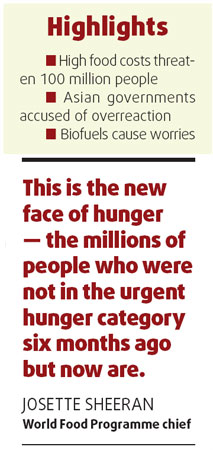Food crisis threatens 100m: UN
(China Daily)
Updated: 2008-04-23 06:26
Updated: 2008-04-23 06:26
LONDON: A "silent tsunami" unleashed by costlier food threatens 100 million people, the United Nations said Tuesday, but views differed as to how to stop it.
The Asian Development Bank said there was enough food to go round, and the key was to help the poor afford it. It said Asian governments which have curbed food exports were over-reacting.

In London, Prime Minister Gordon Brown said Britain would seek changes to EU biofuels targets if it was shown that planting crops for fuel was driving up food prices - a day after the bloc stood by its plans to boost biofuel use.
Britain also pledged $900 million to help the UN World Food Programme alleviate immediate problems and address longer-term solutions to "help put food on the table for nearly a billion people going hungry across the world".
The World Food Programme, whose head Josette Sheeran took part in a meeting of experts Brown called yesterday to discuss the crisis, said a "silent tsunami" threatened to plunge over 100 million people on every continent into hunger.
"This is the new face of hunger - the millions of people who were not in the urgent hunger category six months ago but now are," Sheeran said ahead of the meeting.
"The response calls for large-scale, high-level action by the global community, focused on emergency and longer-term solutions."
The WFP said this was the biggest challenge in its 45-year history. Riots in poor Asian and African countries have followed steep rises in food prices caused by many factors - dearer fuel, bad weather, rising disposable incomes boosting demand and the conversion of land to grow crops to be turned into biofuel.
"The era of cheap food is over," said Rajat Nag, managing director general of the Asian Development Bank.
Rice from Thailand, the world's top exporter, has more than doubled this year but Nag urged Asian governments not to distort markets with export curbs, and instead use fiscal measures to help the poor.
"We want to temper what we think is a bit of an over-reaction. There is still enough supply," he said.
India and Vietnam have limited exports, hoping to tame prices at home - while goading them higher abroad.
"Banning of exports is no different from hoarding at a national level," Nag said.
The comments from the ADB echoed statements by the International Monetary Fund and the United Nations, urging countries to ensure more funds in the hands of the poor to buy food, instead of resorting to protectionist trade barriers.
|
||
|
||
|
|
|
|

